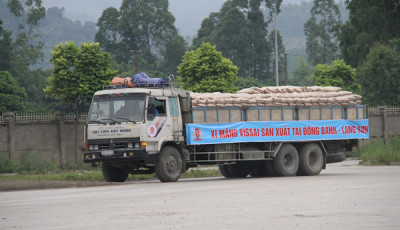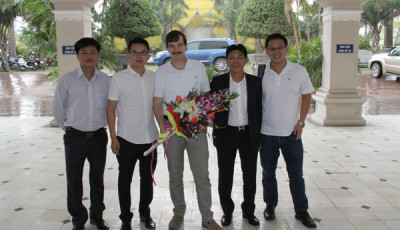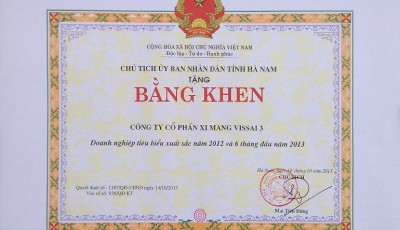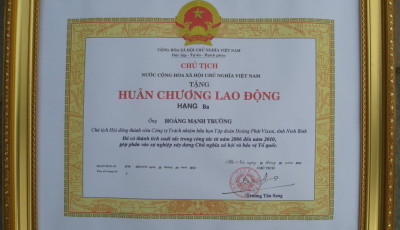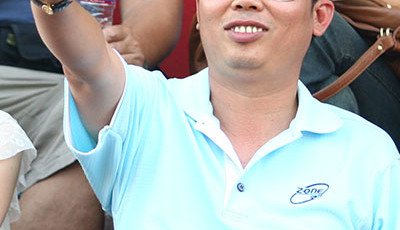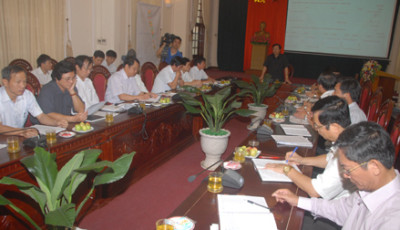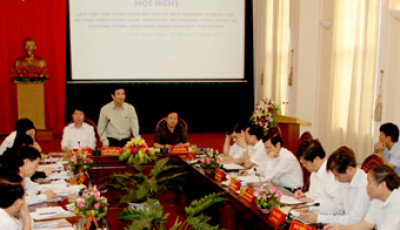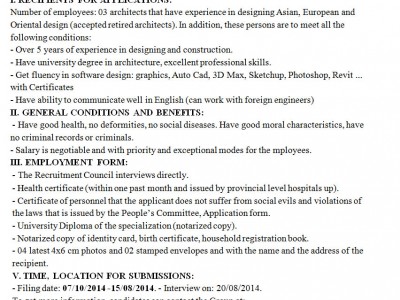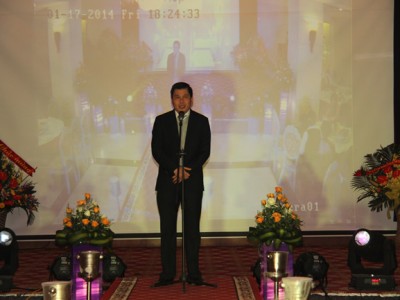2013 – A bad year for the health sector
VietNamNet reviews major events in the health sector in 2013.
The incidents related to vaccines
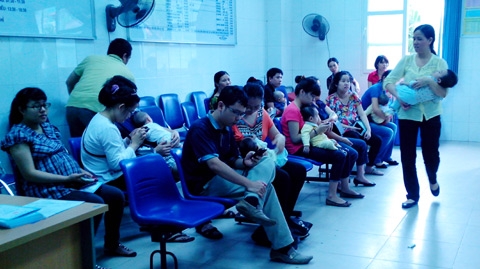
According to statistics, from late 2012 to August 2013, 15 children died after being vaccinated with the 5-in-1 Quinvaxem. In early May 2013, the use of this vaccine was suspended for quality inspection. Results showed that the vaccine is safe so it was reused from October 2013.
However, after the vaccine was re-used, many children suffered from reactions, including two deaths but the Ministry of Health said the children did not die of the vaccine.
Many people stopped taking their kids to public health stations to get free vaccines provided by the national expanded vaccination program, but to private clinics for service vaccines. However, a vaccine stealing scandal was detected at the Hanoi Preventive Medical Center in May 2013. Some children were injected with insufficient vaccine doses. A health worker was fired in this scandal.
In the central province of Quang Tri, an “unprecedented” incident occurred when three infants died after hepatitis B vaccination in the hospital of Huong Hoa district on July 20.
Until now, the cause of the death has not been officially announced but the vaccine quality has been excluded by the Ministry of Health.
“Cloning” blood test results in Hoai Duc Hospital
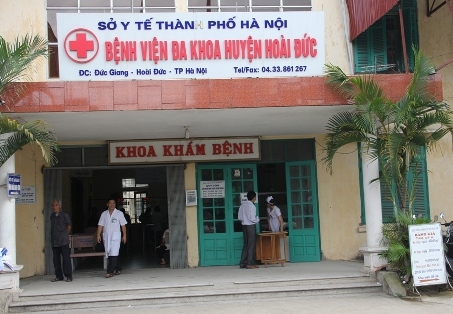
The Hoai Duc Hospital.
In early August 2013, the “cloning” of blood test results in the Hoai Duc District Hospital, Hanoi, was uncovered, making the public outraged.
The scandal was unveiled from the denunciation of Ms. Hoang Thi Nguyet, a staff at the hospital’s laboratory. Accordingly, the hospital director Nguyen Tri Liem instructed his subordinates to “clone” a series of blood test results of patients to steal money from the health insurance fund.
As a result, many patients had the same blood test results. The incident did not cause significant economic consequences because the corrupted amount was only over VND16 million ($800) but it was acceptable in terms of ethics.
Hanoi police investigated the case and prosecuted 10 people.
Infant almost buried alive
The Quang Nam General Hospital recently returned a newborn baby who was still alive to the family for burial. When bathing the baby before burial, the family discovered that the baby was still alive.
There were a lot of deaths of patient related to careless mistakes by medical personnel.
On August 4, a mother and her baby died after a preterm birth in the Mekong Delta city of Can Tho.
The woman had vaginal bleeding on August 2, at the 29th week of pregnancy, and was brought to the Central Hospital of Can Tho. Diagnosing still birth, doctors placed medication for normal birth to a baby girl weighing 1.7 kg. However the mother got weaker and weaker and died after a few hours. Can Tho City Police performed autopsies to find the cause of the death.
Another woman in Thanh Hoa province also died after an injection on July 16. The 34-year-old woman with signs of labor was brought to the health station of Thach Son commune. She was examined by two nurses and injected with an unclear drug. Approximately 1 hour after the injection, the woman lost consciousness and died.
On July 14, a nurse of the Hanoi Obstetrics Hospital–while pushing a stroller carrying five babies to the bathroom slipped, making the babies fall to the ground
After this incident, the Hanoi Obstetrics Hospital has replaced these small strollers by bigger ones, operated by two nurses to avoid such incidents.
In Can Tho, a nurse took the wrong aerosol solution (Ventolin), which is used orally to inject a 7-month-old baby at Phuong Chau Hospital on July 31. Thankfully, the incident was quickly detected.
Doctor throws patient body into river
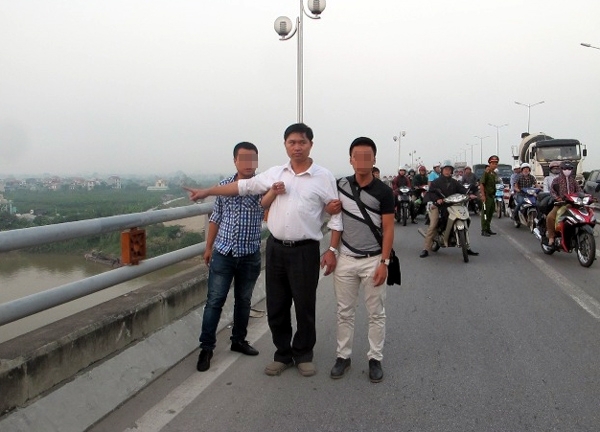
Dr. Tuong on the Vinh Tuy Bridge, where he threw the patient body into the river.
This is the worst-ever case of the health sector. In mid-October, a Hanoi woman – Le Thi Huyen deposited VND50 million ($2,500) for an abdominal liposuction and breast augmentation operation at the Cat Tuong beauty salon, ran by Nguyen Manh Tuong, 40, a doctor of Bach Mai – the country’s largest hospital. The victim died during the operation and her body was thrown to the Red River by Tuong and his employee named Khanh.
Since then the police and the family have been searching for the body along the Red River but they did not find the victim.
From December 1-5, the geo-radiation method was used in the search of the body along 10km of the Red River, from the Thanh Tri Bridge in Hanoi to Van Giang town in Hung Yen province but the body was not found yet. The family is still searching for the body.
Health Minister Nguyen Thi Kim Tien said that she was very much in “pain” and Dr. Tuong’s act would be strongly condemned. Many people also believed that Tuong’s action destroyed the image of the health sector.
The highlights
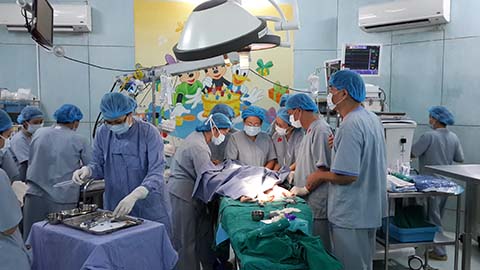
Besides scandals, the health sector had some highlights in 2013.
It is the successful quintuplet at the Tu Du hospital, HCM City. A 28-year-old woman in District 5, Ho Chi Minh City, on the night of March 17 gave birth to five babies by Cesarean at the Tu Du Hospital. This is a rare case of multiple pregnancies, using the measure of injecting sperm into the uterus. Three baby boys and two baby girls were born in turn, weighing 2 kg – 1.5 kg – 1.8 kg and 2 babies of 1.3 kg each.
The next event is the successful separation of the conjoined twins Long – Phung at the HCM City Children’s Hospital 2 in early December.
The twins, from Ninh Thuan province, were born 14 months ago and they had since undergone a special care mechanism at the hospital before the surgery in November. Before the operation, one of the twins was in good health condition, and the other was suffering after-birth cerebral hemorrhaging and pneumonia with respirator support. Doctors decided to separate the twins because any deterioration of the weaker baby could threaten the lives of the two. A group of 70 doctors worked hard for almost 10 hours to bring new lives to the babies.
Doctors conducted surgery at home to save a pregnant woman: On December 4, a 36-year-old pregnant woman in Vu Thu District, the northern province of Thai Binh, suffered from sudden severe bleeding at home. To save her, doctors decided to perform a surgery at home.
The surgical team piled two tables to make the operating-table. The operation took place in the absence of supportive equipment as well as light and sterile conditions. The patient has the rare blood type of AB so doctors had to take some blood from her family members.
After the surgery, the patient was transferred to the Thai Binh Obstetrics Hospital. The rare operation had the participation of doctors from the Thai Binh Obstetric Hospital, the Thai Binh General Hospital and the Emergency Center 115.
In 2013, for the first time the Ministry of Health launched hotlines to receive comments of patients.
Another event showed the health sector’s determination to tighten discipline is that the Tu Du Hospital, HCM City, penalized a doctor who shouted at a pregnant woman.
Health Minister Nguyen Thi Kim Tien said that the Ministry would continue to implement governing over hospitals and health workers to better serve patients.
Cam Quyen




